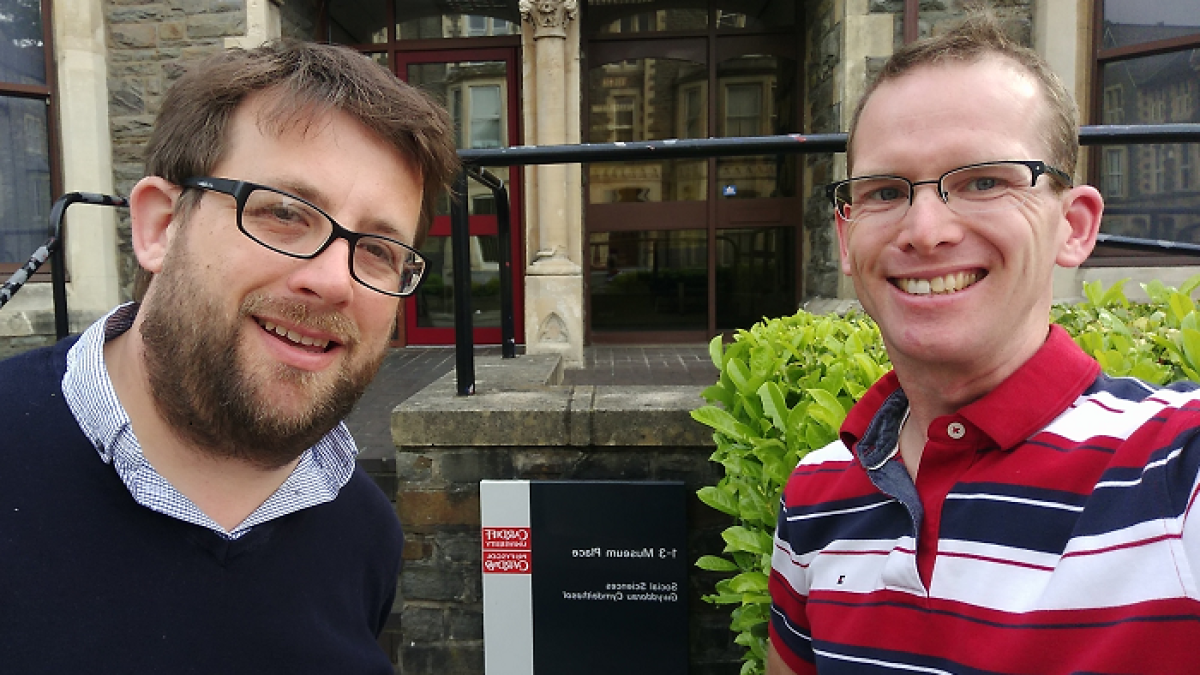ASU professor receives funding to pursue international research project

Dr. Jeremy Segrott (left), Cardiff University, and Jonathan Pettigrew (right), assistant professor in ASU’s Hugh Downs School of Human Communication pictured at Cardiff University.
International funding has allowed Jonathan Pettigrew to travel to Cardiff University, DECIPHer unit, in Wales, United Kingdom to develop a collaboration on an international project to create a theoretical model and joint grant proposal on health interventions.
Pettigrew, an assistant professor in Arizona State University's Hugh Downs School of Human Communication, and co-collaborator Jeremy Segrott, Cardiff University, received Cardiff University’s International Collaboration Seedcorn funding for summer research.
Pettigrew and Segrott are exploring the possibilities of an international collaboration project that would allow Cardiff University doctoral students to travel to ASU for a short-term project, allow some ASU doctoral students to travel to Cardiff and establish funding for Segrott to visit ASU in the future.
Pettigrew became acquainted with DECIPHer researcher Segrott through involvement in the Society for Prevention Research and the European Society for Prevention Research .
They shared the same process evaluations of health interventions; they approached the same topics, but had different training experiences; and they considered different theories and applied different methodologies.
They worked in different contexts, countries and continents.
“Our diverse perspectives enabled us to converge on the topics from different angles and soon realized the potential benefits of working together,” said Pettigrew, when asked about the importance of bringing international scholars to ASU to promote global health.
Current and previous health intervention models use linear, unidirectional thinking according to Pettigrew.
The health intervention model Pettigrew and Segrott are developing is to push thinking toward considering complex systems.
“Specifically, we are drawing attention to the fact that individuals actively interpret intervention messages and also interface with their social networks (e.g., to discuss, modify, ignore, eschew, etc.) intervention messages,” Pettigrew said.
When asked how their theoretical model would benefit international scholars of global health, Pettigrew suggested that some interventions work but that the mechanisms to make them work depend on inputs from other domains of life.
Pettigrew cited one example of a school intervention for kids to advocate healthy eating depends on families buying healthy foods, cooking meals, etc. He said there are a lot of processes that the intervention depends on to make it work and not many of them are things that happen at school.
Pettigrew and Segrott are calling this an "invisible logic model" where the way the intervention works is a bit of a mystery.
“Our model theorizes that interactions between domains of life (e.g., family and school; work and neighborhood, etc.) should be considered. We detail potential processes in these social interfaces that bear on intervention effectiveness,” Pettigrew explained.
“A critical need in the development of global behavioral health promotion is understanding of how specific contexts influence and are influenced by interventions,” Pettigrew said. “Particularly salient is the need to identify and specify intervention systems and to query aspects of these systems that are interdependent with contexts and those that likely transcend contexts.”
Though still in the preliminary stages of development, the joint grant proposal Pettigrew and Segrott are drafting would focus on building prevention systems to promote global health.
Pettigrew is not a novice at receiving grants for international research projects. He previously won a total of $1 million dollars to develop a culturally adapted anti-drug program with a violence prevention aspect for middle school youth in Nicaragua. His program was named a “model program” by the U.S. Department of Health and Human Services.
More Health and medicine

'Incredible milestone': ASU, city of Phoenix announce location for ASU Health headquarters
Citing the need for a “new way” of doing things, Arizona State University President Michael Crow said that the headquarters for…

Have a health question? This newsletter is for you
You sprain a knee while playing basketball. Your stomach hurts all the time. You keep getting bad headaches.What’s the first…

Spring clean your social life
Spring: a season of growth, warmer weather and perhaps a case of the sniffles. But as much as the flowers are budding and…